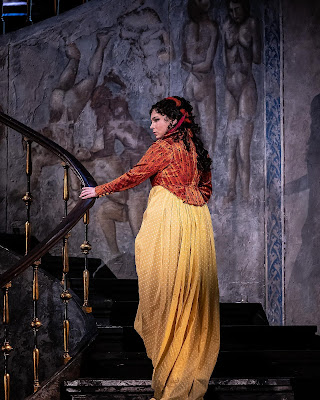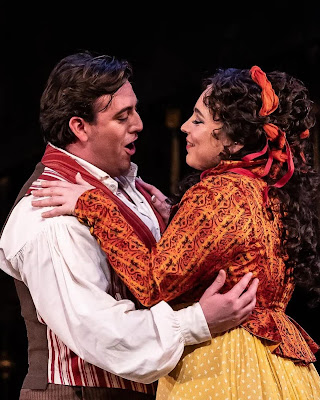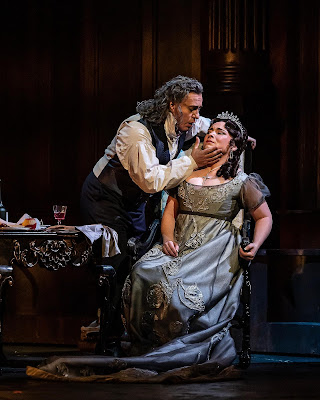Puccini: Tosca; Natalya Romaniw, Freddie De Tommaso, Erwin Schrott, director: Jonathan Kent/Simon Iorio, conductor: Daniel Oren; Royal Opera
Puccini: Tosca - Natalya Romaniw
Royal Opera (Photo Clive Barda)
Reviewed 18 December 2022 (★★★★½)
A terrific trio of principals make sparks fly and give us some terrific singing in this latest revival, featuring Natalya Romaniw's house debut as Tosca
The Royal Opera has only had three productions of Puccini's Tosca since the company was founded in 1946. The first, directed by Christopher West, used pre-war sets and costumes. The second was of course Zeffirelli's iconic production which ran from 1964 to 2004, but the company seems to have managed to pull off the difficult trick of replacing one long-running, beloved production with another. Jonathan Kent's production of Puccini's Tosca debuted in 2006 and seems set to go for a while longer.
We caught the most recent revival of Tosca at the Royal Opera House on Sunday 18 December 2022. Daniel Oren conducted, with Natalya Romaniw as Tosca, Freddie De Tommaso as Cavaradossi, and Erwin Schrott as Scarpia, the revival director was Simon Iorio, and the designer Paul Brown.
Kent's production is largely traditional and Paul Brown's sets have an imaginative luxuriousness about them. It remains one of the few productions around that manages to stage the end of Act One in a manner which is both liturgically and dramaturgically satisfying. Too often, liturgical logic goes out of the window because the requirements of opera are paramount. Here, with the two storey set with a view of the altar from behind, Kent manages to do both.
The production provides a strong shell in which different casts can bring their interpretations to bear, it tells the story admirably and lets the singers fill the spaces. As such, this means that each revival depends on the personalities of the singers involved and the chemistries developed in the rehearsal studio. Recent productions of Tosca that we have seen have sometimes fallen short on the chemistry aspect, with the relationship between Tosca and Cavaradossi failing to catch fire.
 |
| Puccini: Tosca - Freddie De Tommaso, Natalya Romaniw Royal Opera (Photo Clive Barda) |
Romaniw makes a classy Tosca, poised, beautifully sung and wonderfully detailed. Above all it was a very winning performance, she was girlish and charming; for all Tosca's demanding nature, you understood why Cavaradossi might fall for her. The moments of jealousy (and Romaniw was wonderfully vivid here) came as part of the whole. In Act Two, a finely sung 'Vissi d'arte' became simply part of the whole, this was a performance that vibrated with passion throughout.
Cavaradossi is a far more sympathetic character than Pinkerton, and Freddie De Tommaso gave him a nice sense of self-important swagger. In interviews, De Tommaso talks of being inspired by the great tenors of the past and his performance had a slightly old-fashioned air to it, a certain grandness of gesture, a tendency to luxuriate in the phrases and to lengthen high notes and the ends of phrases. If done well, it works and here it was very well done. De Tommaso has a fine, baritonal centre to his voice with gives it a thrilling darkness.
Erwin Schrott (whom we last saw at Covent Garden as Don Giovanni) played Scarpia as a somewhat older, version of the Don. This was a Scarpia still living on the fruits of his good looks, yet relishing the pain he could cause. Schrott's was a finely detailed performance, chilling, and bombastic but with hints of other aspects too. You felt that the role lay rather on the edge of the possible for Schrott's voice, he did not naturally dominate the close of Act One, but managed it through a nice combination of musicality and drama. But throughout he was far more believable than some as a suave seducer.
 |
| Puccini: Tosca - Erwin Schrott, Natalya Romaniw Royal Opera (Photo Clive Barda) |
Josef Jeongmeen Ahn made a fine Angelotti indeed, well sung and believable with Jeremy White as highly characterful Sacristan. Hubert Francis was a strong Spoletta, but this production keeps him and Sciarrone (an equally fine Thomas D. Hopkinson) relatively in the background.
In the pit, Daniel Oren gave the singers as much space as they required, but the down side of this approach was that when the singers were not actually singing, the orchestral contribution remained equally unassuming and rather lacking in dramatic fire.
Never miss out on future posts by following us
The blog is free, but I'd be delighted if you were to show your appreciation by buying me a coffee.
Elsewhere on this blog
- A lovely way to begin the Christmas season: Handel's Messiah from Laurence Cummings & Academy of Ancient Music at Barbican Centre - concert review
- Making ancient music sound modern: Franck-Emmanuel Comte on Le Concert de l'Hostel de Dieu's mixing old & new music, collaborating with beatboxers, hip-hop and more - interview
- 20 Christmas pieces by 19 women composers from the 20th and 21st centuries: Somerville College Choir's The Dawn of Grace - record review
- To enter White's world is to enter a parallel universe: Alastair White's opera Rune recorded live on Metier - record review
- Manic energy and musical vision: Alex Paxton's ilolli-pop on nonclassical - record review
- How Cold the Wind doth Blow: songs by RVW, friends and pupils at Wigmore Hall - concert review
- A tricky relationship: the friendship of Benjamin Britten and W H Auden examined in London Song Festival's final event of the season - concert review
- Persephone: young film composer Veronika Hanl's lockdown project began as the stripped-back telling of a classic tale from Greek mythology - interview
- Music that barely survived, brought back to life: Ensemble Pro Victoria's Tudor Music Afterlives - record review
- In a piece of rare late, late Offenbach, New Sussex Opera proves exemplary in their grasp of staging operetta with charm, energy and style - opera review
- Swirling, static energy: Ruthless Jabiru & Decibel New Music Ensemble at Brunel Museum - concert review
- Barely registering on the historical record, Vincente Lusitano's music proves a richly rewarding experience - record review
- Home

.jpg)



.jpg)





No comments:
Post a Comment